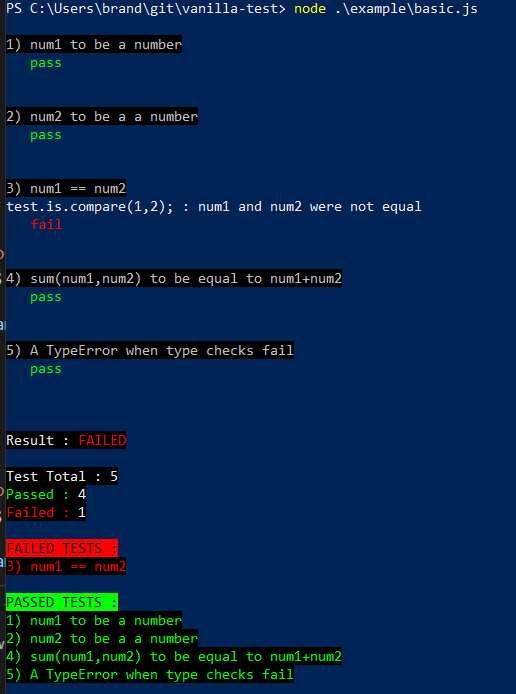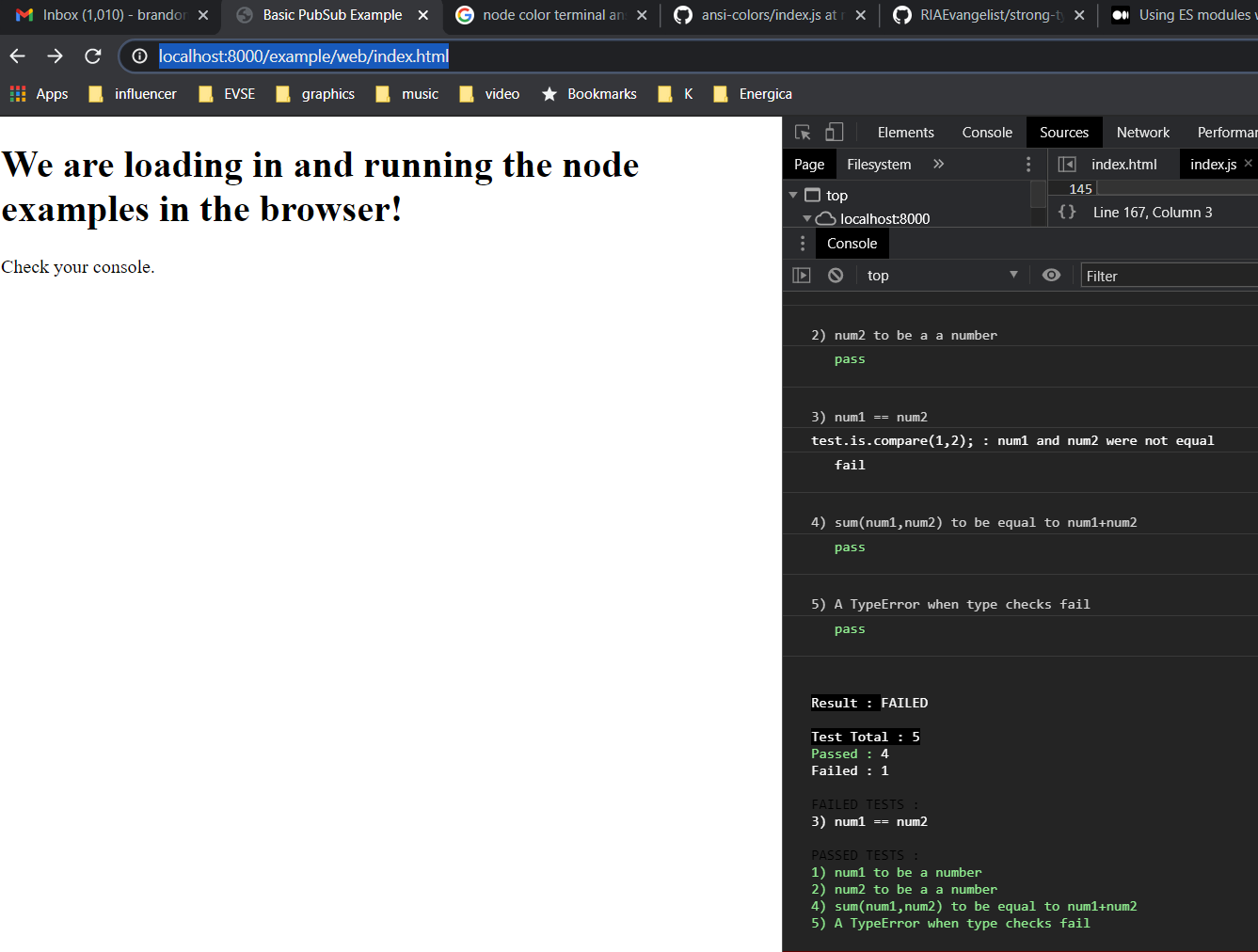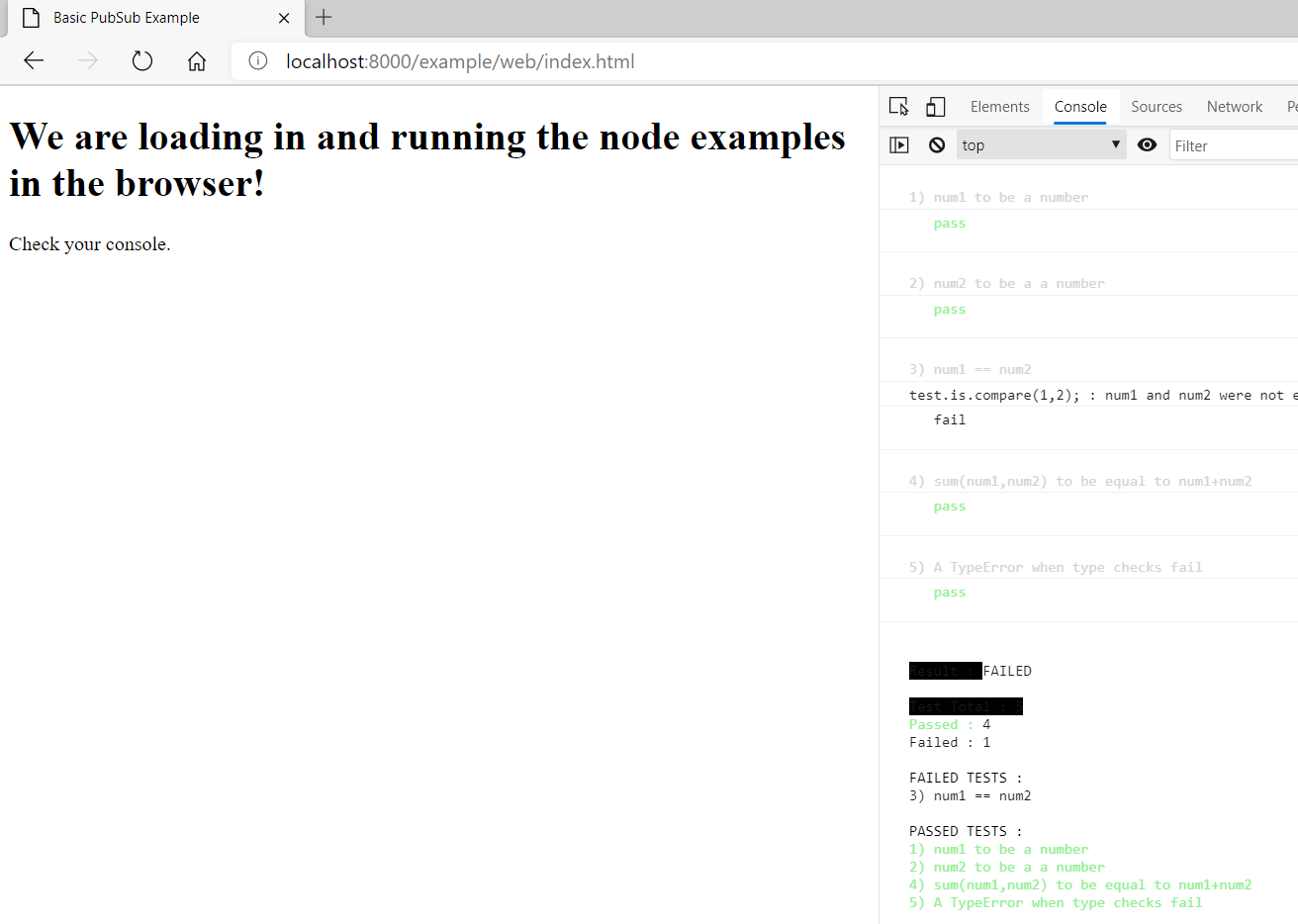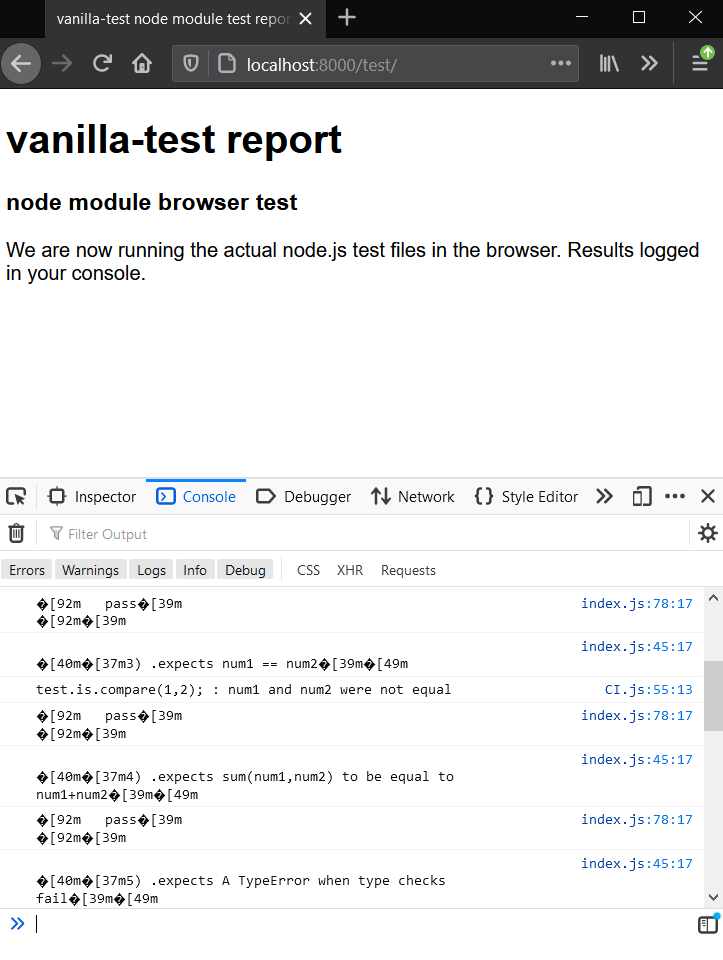This is a minimalist and pure js testing utility/suite/framework. It will work with ES6+ modules and common.js modules. The VanillaTest class is perfect for extending and very fast. There is no boilerplate, no fancy setup, just write your tests and run them from your npm test command.
Build Info :
Travis CI (linux,windows & Mac) : Appveyor CI (Windows) :
Super light and fast Extensible pure JS testing for the win! Vanilla Test works in node, browsers, electron, anywhere JS runs.
| method | args | returns | description |
|---|---|---|---|
| expects | description:string a unique test descriptor |
string : numbered test descriptor |
this sets up the current test |
| pass | strict:boolean throw if the test already passed or failed previously. This defaults to false |
string : numbered test descriptor |
call this to pass the test |
| fail | strict:boolean throw if the test already passed or failed previously. This defaults to false |
string : numbered test descriptor |
call this to fail the test |
| done | string : numbered test descriptor |
Ends the test. If the test has not yet passed | |
| report | CI:boolean defaults to true. This will try to exit after reporting letting your CI know the test is complete in node, or return the number of failures in the browser. If set to false, it will return the results:object for you to use. This could be used for report builders or other integrations. {passed:[...strings], failed:[...strings]} |
report : string : report |
report showing passed and failed tests. This will also communicate with your CI like circle CI or Travis CI |
| delay | delay:number number of times to itterate |
chainable ref | this can be used to waste some time while waiting for short async operations to execute, like event propagation |
| compare | arg1:any, arg2:any, error:string |
chainable ref | inherited stong-type .compare method which checks arg1==arg2 and throws |
vanilla-test uses the strong-type class which provides methods to test all the built in js primatives, objects, classes, and even fancy things like async functions and generators.
full strong-type documentation
The strong-type methods are available on the .is method.
import VanillaTest from './node_modules/vanilla-test/index.js';
//not actually running tests in this example, just demonstrating
//strong type checking
//see the documentation link above to learn about all the methods, this is just to show a couple
const test=new VanillaTest;
test.is.string('hello');
test.is.number(1);
test.is.int8Array(new Int8Array(3));
test.is.asyncFunction(async function(){});
test.is.asyncGeneratorFunction(async function*(){});
function* genFunc(){}
let generator=genFunc();
test.is.generatorFunction(genFunc);
test.is.generator(generator);
//see the documentation link above to learn about all the methods, this is just to show a coupleThese basic examples should be enough to get you started testing right away.
Since we use the same files for node and the browser, we need to emulate a production npm i vanilla-test in the example folder, so be sure to :
first run npm run emulate
then run node ./example/basic.js to see the example output.
run npm start this will automatically run npm run emulate for you as well.
Then just go to the local server : http://localhost:8000 from here you can see both the examples and the tests. Or go directly to the local example : http://localhost:8000/example/. It actually imports the node example into the browser and runs it, same exact file, no transpiling or custom code for the browser. If you want to transpile though, you can.
//import with relative paths to shim for browser
//this way the same code will work on the web as it does in node
//litteraly the same file without even transpiling,
//but you can transpile if you want.
import VanillaTest from './node_modules/vanilla-test/index.js';
const test=new VanillaTest;
//setup
const num1=1;
const num2=2;
function sum(a,b){
return a+b;
}
// 1) expects num1 to be a number
try{
test.expects('num1 to be a number');
test.is.number(num1);
}catch(err){
console.trace(err);
test.fail();
}
test.pass();
test.done();
// 2) expects num2 to be a a number
try{
test.expects('num2 to be a a number');
test.is.number(num2);
}catch(err){
console.trace(err);
test.fail();
}
test.pass();
test.done();
// 3) expects num1 == num2
//this test should fail for demonstration purposes
try{
test.expects('num1 == num2');
test.compare(num1,num2);
}catch(err){
console.log(`test.compare(${num1},${num2}); : num1 and num2 were not equal`);
test.fail();
}
test.pass();
test.done();
// 4) expects num1 == num2
try{
test.expects('sum(num1,num2) to be equal to num1+num2');
test.compare(
sum(num1,num2),
num1+num2
);
}catch(err){
console.log(`sum(${num1},${num2}); was not equal to num1+num2`);
test.fail();
}
test.pass();
test.done();
// 5) expects A TypeError when type checks fail
try{
test.expects('A TypeError when type checks fail');
test.boolean(new Array(2));
}catch(err){
try{
test.is.typeError(err);
}catch{
console.trace(err);
test.pass();
}
test.fail();
}
test.fail();
test.done();
//Lets take a look at the test results and let our CI know
// that the tests have completed and passed or failed
test.report();
You can run the modules tests and see the reports in either node and the browser. Node will run the tests in the node environment, and browsers will actually imort the node code and run it in the browser.
run npm test you will see the reults right there in the terminal.
run npm start then go to the local test : http://localhost:8000/test/. It actually imports the node test into the browser and runs it, same exact file, no transpiling or custom code for the browser. If you want to transpile though, you can.
I'm actually pretty pleased with how easy this was. Feel free to use the same type of scripts in your projects. You can even copy paste and just change the repo/module names if you want. Here is the code from my package.json using && is important otherwise your commands will run in parallel, and you really need them to run atomically.
This is needed because we use relative paths in our ES6+ modules to allow the same exact js to work in node and the browser. Its what we have all been waiting for!
"scripts": {
"test": "npm run emulate && node ./test/CI.js",
"start": "npm run emulate && node-http-server port=8000 verbose=true",
"emulate": "npm i && copyfiles -V \"./!(node_modules)/*\" \"./**!(node_modules)\" \"./example/node_modules/vanilla-test/\" && copyfiles -V \"./node_modules/**/*\" \"./example/\" && copyfiles -V \"./!(node_modules)/*\" \"./**!(node_modules)\" \"./test/node_modules/vanilla-test/\" && copyfiles -V \"./node_modules/**/*\" \"./test/\""
},
npm start actually starts a node-http-server. So if you just want quick links to the example and test web pages, there is a page in the root of this module with links. You can access it by going to the local homepage : http://localhost:8000
Provided your router and firewall are not blocking your IP/ports, you can also go to http://[your-ip-here]:8000/ on any device including your mobile device provided it is on the same network.
We use the free Digital Ocean Static Apps to host a version of the local server. It is exactly the same as if you ran npm start on your machine. You can also use this like a CDN as it automatically rebuilds from main/master each time the branch is updated. vanilla-test CDN home : https://cdn-p939v.ondigitalocean.app/vanilla-test/
The address url in the screenshot is outdated, see above for the actual address.
The address url in the screenshot is outdated, see above for the actual address.
As of 11/22/2020 FF still does not support private fields or methods in js classes, however, the nightly build has it included behind a flag. With the private field and method flags set to true, FireFox nightly works like a charm... However, firefox's console does not support ansi escape characters, so we will need to make a report builder for it that logs it out better. Thankfully the code is already set up to support that if you run the reports like so : .report(false) it will return an object you can use to make a report in node or the browser. It's documented in the methods table above.









